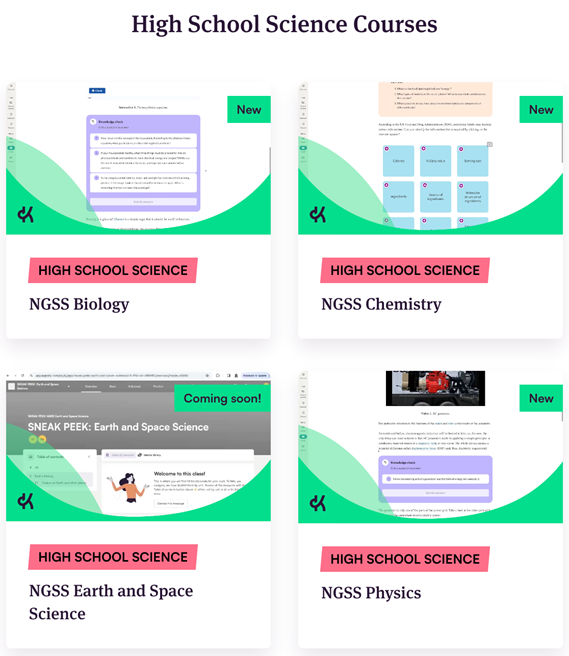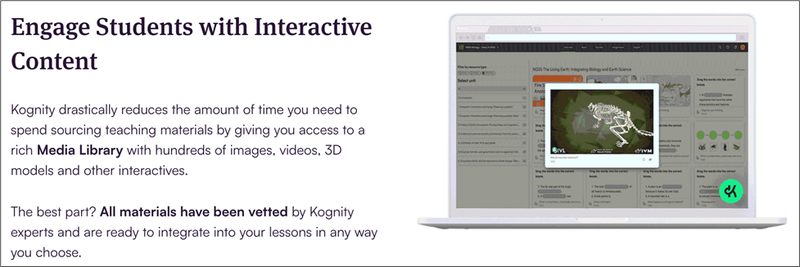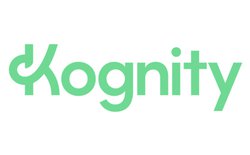Kognity for High School Science presents phenomena-based science in an easy and flexible way, empowering teachers to bring science to life with confidence. Whether teachers use lessons to spark ideas or dive in and adopt the full curriculum, Kognity’s content can be seamlessly integrated into existing plans.
Crafted by experts and built specifically for the Next Generation Science Standards (NGSS), Kognity’s rigorously vetted biology, chemistry, and physics content supports teachers in implementing complex standards. The curriculum includes embedded and color-coded performance expectations (PEs), crosscutting concepts (CCCs), science and engineering practices (SEPs), and disciplinary core ideas (DCIs) throughout.
All Kognity lessons are centered on a rooted phenomenon. A curated Driving Question Board inspires a student-led and teacher-guided classroom and acts as a stepping stone into phenomena-based learning, which helps students make meaningful connections to real-life situations and become more engaged in their learning.
As a leading assessment tool, Kognity is designed to improve test scores by familiarizing students and teachers with content and performance in CCCs, SEPs, and DCIs, and to save teachers time grading three-dimensional learning and helping track student progress with reliable data.
Kognity integrates with all major learning management systems, including Canvas, Schoology, Microsoft Teams, and Google Classroom.

Formats/platforms:
Kognity for High School Science is available via any internet-connected device and can be used offline with printed material as well.
Primary URL:
Problem solved:
Kognity for High School Science helps teachers provide phenomena-based science instruction while streamlining their workloads.
Phenomena-based teaching and learning is very complex and hard to produce without extensive time to dedicate to lesson planning, prepping, and application. Kognity removes the barriers to allow educators and students to engage in quality phenomena-based learning every day. The flexibility of style and format makes Kognity a time saver and stress reliever, with the framework and content designed for the NGSS provided so teachers no longer need to create from scratch; Kognity can be their idea generator or it can be taught with fidelity, featuring vetted content teachers can rely on without worry.
Kognity provides schools with individualized onboarding professional learning at no additional cost. School leaders have options for unique skill training for teachers learning to use Kognity in their classroom.
Kognity's in-depth content, combined with real-time results, aims to reach all learners by providing ELL support, including support for more than 130 languages, and a variety of learning modalities, from visual to auditory, to make science approachable.

Grade/age range:
Kognity for High School Science is designed for students in grades 9-12.
Does your product address core/supplemental/special needs/extracurricular/professional development?
Kognity for High School Science addresses the core subject of science, and administrators can use the Educator Hub to customize and track professional development. Kognity also offers free training and onboarding that includes a welcome pack of resources to get started, 30, 60, and 90 day check-ins, digital training, and on-site training. Additionally, Kognity offers customizable paid professional development.
Standards:
Kognity for High School Science is designed for the Next Generation Science Standards and the ESSA Level IV (Demonstrates a Rationale) requirements of evidence standards.
Lesson time needed:
Time required varies by classroom and group of students.
Pricing model:
Schools can explore Kognity for High School Science through a free 30-day trial. Yearly subscriptions are available, with pricing based on the number of student licenses requested.
What makes Kognity for High School Science unique?
Kognity for High School Science was designed from the beginning for the Next Generation Science Standards, allowing teachers to transition into phenomena-based learning with confidence. Throughout all units, down to the module and lesson level, NGSS standards & PEs are color coded, so teachers never have to worry about what standard they are covering or if the lesson covers a particular standard. The media library puts thousands of videos, images, interactive models, and simulations at teachers’ fingertips. Glossary and vocabulary boxes introduce and reinforce key scientific terms and definitions.
To help all students embrace phenomena-based learning, Kognity for High School Science offers reading assistance with multiple fonts and styles, audio support and more than 130 language options. They can record observations in the integrated student notebook and test their knowledge with activity sheets, strength questions, performance tasks, and quizzes.
Characteristics:
Built for easy implementation, Kognity for High School Science provides teachers comprehensive guides, clear instructions, and personalized support. Kognity also integrates with several major learning management systems, simplifying processes including grading, task management, rostering, and signing in, among others.
Here’s what users are saying:
“Kognity is an open framework, so if you have an experienced team of educators, there’s plenty of space to add your own flair. But for our new, young educators, it’s a complete program for them, which helps them succeed.”
— Marcos Cabreros, chemistry teacher, Edison High School, CA
“Kognity is a well-organized, visually appealing resource for students and educators. The fast grading and immediate feedback for students is awesome. I am not going back to a traditional textbook.”
— Juliet Perry, chemistry teacher, Shaker Heights High School, Ohio
“Kognity allows me to spend my planning time searching for more activity-based or discussion-based activities. I don’t have to worry about delivering content or grading homework. It allows me the flexibility to do the things that are honestly more fun to do as a teacher.”
— Stephen LoBianco, economics teacher, American School of Doha, Qatar











